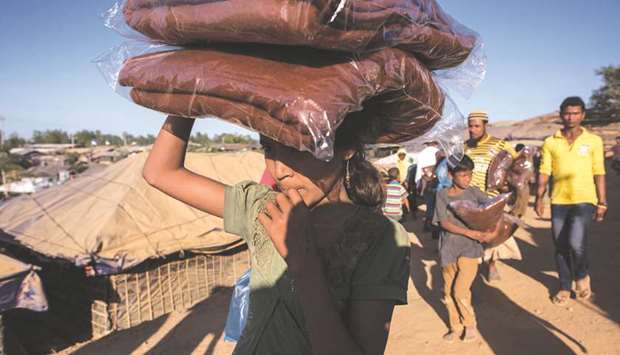A sudden cold snap in southeastern Bangladesh has caught refugees off guard in the makeshift Rohingya camps along the border with Myanmar, with aid workers rushing to distribute blankets to families struggling for warmth in their open-sided shanties.
Medics running hospitals and clinics in Cox’s Bazar district - where more than 620,000 Rohingya have arrived in the past three months - are reporting huge spikes in ill-equipped refugees falling sick from exposure to the elements.
“The number of patients with cold-related illnesses has increased at least five-fold in the last week. Most are children suffering with pneumonia,” Zakaria Mahmud, a duty doctor at a local hospital in Teknaf town, said.
The hospital was so overcrowded that those awaiting treatment were sleeping on the floors of the wards, Mahmud added.
Children were especially vulnerable to the cold, he said, because they did not have proper clothing to ward off the
chilly nights.
Overnight temperatures in Cox’s Bazar had fallen to around 14 degrees (56 Fahrenheit), far from freezing but cold enough to test limits for refugees - particularly children - living in tarpaulin tents on the bare ground, aid workers say.
Zafrullah Chowdhury, head of a Bangladeshi medical charity, said the cold threatened to worsen the health of children whose immune systems are
depressed.
More than half of those to flee violence in Myanmar for Bangladesh since August are children, and many arrived malnourished or suffering from bronchitis or diarrhoea.
“I’m very concerned, especially for refugee children. Their condition will degrade if they don’t get enough warm clothes soon, as the winter will get harsher in the hills,” Chowdhury, the founder of
Gonoshasthaya Kendra, said.
Many of the displaced Muslims fled an upsurge of violence in Rakhine State - described by US and UN authorities as ethnic cleansing - with little more than the clothes on their backs, relying
on charities for everything.
“We left Myanmar with few belongings, and now winter is coming and we don’t have enough clothing to protect ourselves,” said Nurun Nahar, 50, whose grandson was coughing inside their shanty.
Kunchuma Khatun worried her three-year-old son’s cold would worsen if her family of five spent another cold night huddled under a single blanket.
“It becomes very cold during late night. We have only one blanket that we all share. I haven’t got any more blankets from the aid distribution
centres,” she said.
Aid agencies are overstretched, struggling to distribute blankets fast enough to keep up with the staggering need in the teeming refugee camps.
“If we bring 500 blankets, 5,000 people turn up. I don’t know how many would be enough,” said one soldier manning an aid distribution point at one of Cox’s Bazar’s largest
settlement camps.
As the evenings get colder, refugee children are spending their days collecting dry straw from rice fields to burn throughout the night to
keep warm.
“The fire will keep my baby siblings warm,” said eight-year-old Rohingya girl Nur Kalima.
Local authorities are concerned such open fires in dry weather could wreak havoc in the densely-populated camps, where refugees live cheek by jowl on hillsides dotted by simply
bamboo and plastic tents.
“If the fire spreads in these camps, God forbid, thousands of shanties will turn to ashes in such dry weather,” said Mohammad Jahanur, fire service inspector at Cox’s Bazar.
A young Rohingya refugee carrying blankets handed out by an aid organisation in the Kutupalong refugee camp in Cox’s Bazar district of Bangladesh yesterday.

